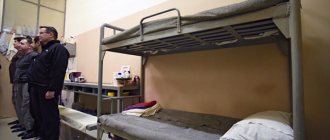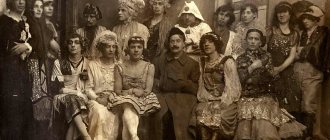The temporary detention center (SIZO) houses people under investigation and all those who are awaiting transfer to correctional institutions - prisons, colony settlements and others. The period of stay in a pre-trial detention center can last for several months, so a person one way or another has to adapt to the new environment. One of the most important components of life behind bars is hygiene. In addition to formalities, there are also unwritten rules that the detainee must strictly adhere to.
The total period of stay of a defendant in a temporary detention center before transferring the case to court can last up to 18 months. The pre-trial detention center has both single and general cells. The second option is more common. In crowded conditions, hygiene in rooms with several people becomes almost of paramount importance.
What is due to a prisoner?
Before being assigned directly to the cell of the pre-trial detention center, the defendant is given cutlery, a towel and a set of bedding, which includes a blanket, pillow and mattress. As a rule, prisoners have their own clothes, but if something happens they can be provided with them on the spot.
Also, those placed under arrest for general use, based on the number of people, are given laundry soap (200 grams per month per prisoner), toilet paper, toilet soap (50 grams per month for men and 100 for women). They don’t forget about the things necessary to keep the cell clean: brooms, dustpans, rags and other household supplies.
The prisoner must bring his own toothpaste and brush. However, in the event of their absence and the impossibility of acquiring them with one’s own funds, these items are given to the person under investigation on the spot. The same applies to disposable razors for men and intimate hygiene products for women.
Unwritten hygiene rules
A person entering a pre-trial detention center for the first time will be told in his cell what he can do and what he should refrain from doing. For example, you cannot shake hands or in any way touch the “offended” - those who, for various reasons, have been relegated to the very bottom of the prison hierarchy.
A cell in a pre-trial detention center is no different from a prison cell. The same shelf for toiletries, trash can, toilet and washbasin. All this is nearby.
In a prison environment, it is very important to monitor both personal hygiene and the cleanliness of the surrounding area. However, it is extremely difficult for an unprepared psychologically to maintain himself in proper order. Depressing thoughts about imprisonment and unclear prospects for the future make you give up and stop taking care of yourself: washing, shaving, brushing your teeth.
However, some cameras do not have a mirror, which further aggravates the situation. A person who has given up on himself begins to gradually become convinced that no one is interested in his appearance anymore. People who are familiar with the realities of prison first-hand advise that such thoughts should be driven away by all means.
Prison and life behind bars
There are laws and regulations to regulate the life of prisoners in captivity. Even the entire Criminal Executive Code has been written. But for some reason, in every pre-trial detention center and correctional colony, every chief has his own quirks. There are no pre-trial detention centers or colonies that are alike. Let's talk about the basics, how prisoners wash themselves. Dream of a head washer. For a normal man, being dirty is humiliation. But behind bars you have to go through this at the very beginning of your sentence. On suspicion, any person can be put in a temporary detention facility for two days (recently they were allowed for three). Then they are either released or arrested and transferred to a pre-trial detention center. There are no baths or showers in the temporary detention center. There is also a washbasin in the cell. In the morning and evening they take you to the toilet in large numbers. While the cop is shouting to hurry up and move, you can wash your face with ice water. There is no question of brushing your teeth at all. There is no bedding in the cell. Two thirds of the room is solid wood flooring. There is simply nowhere to go. I have to lie down all the time. It happens that a lot of people are packed into the cell. Then you press against the walls and get your clothes dirty on your “fur coat.” And the floorings themselves are not sparkling clean. Some may think that seventy-two hours is not much of a slog. Maybe this is true, but the police never keep so many. Especially those who don’t confess.
The cops don't beat everyone. If they see that a man is not afraid, they begin to starve him out. Then the detainee is not immediately processed. They may even resort to forgery. Keep him in a cell for three weeks, hide him in a cold cell, and that’s it. Afterwards, fill out a report that they were detained at the station without documents, but on today’s date. Only after this was the arrest issued and taken to prison. Dirty, stinking, overgrown, wearing rotted underwear. All this time (sorry) wiping himself with old newspapers.
The bummer is that a bathhouse for new arrivals is not immediately available. Newcomers are placed in “dog house,” or quarantine, for three days. The next day, if it is not a weekend or holiday, everyone is rushed to the doctors. This is where the humiliation comes in - undressing in front of women, sometimes beautiful ones, and showing them your dirty underwear. That's still okay. It’s scary when they start taking tests. You have to bend over and put your butt up for a smear. It’s good if the person under investigation has relatives or friends who will bring the package directly to the temporary detention facility. Then, if there was a washbasin in the pre-trial detention center cell, you can wash yourself with ice water and change clothes. But this happens if you are sitting in your city.
Conveyor in "crosses"
Okay, let's not talk about sad things. Now I’ll tell you about different places of washing. St. Petersburg "Crosses". At that time, visiting the bathhouse there was very original. It was given once every ten days. The entire cell went down to the basement and into the locker room. The front door was locked from the outside. The door to the shower room was also bolted. While the prisoners were undressing, another cell was being cleaned. After which she went into another dressing room with a separate exit to the corridor and a locked door to the bathhouse. Only then were others allowed into the shower. When the other “hut” was kicked out of the locker room, things were moved there. This was done to speed up the process itself.
The “crosses” were designed for five thousand inmates, but at that time they were filled with up to fifteen thousand. Previously, upon admission to this prison, prisoners were given shorts and a T-shirt. On bath day, you could not wash them yourself, but exchange them for already washed ones. This comes in very handy for the poor. Also on bath day, they were given a small piece of laundry soap and a disposable washcloth. There were six shower heads in the shower room. Even if there were twenty people (in a cell with six sleeping places!), everyone had time to soap themselves twice.
They gave us twenty minutes to wash. Then the guards begin to rush and threaten to beat me. There was one way to prolong the process: write a statement about the roasting with the entire chamber. But the cops sometimes demanded to show evidence in the form of lice. If they were, you could go for a roast not on a bath day. This was considered good luck, especially in the summer. At the same time, it was possible to do something nasty to the guard.
The prisoners in the whole cell caught insects and put them in a matchbox. Not only did they show them to the corps officer so that they could be roasted. On the way there, lice were poured onto his jacket when the ensign walked ahead and opened numerous bars. It was in the bathhouse that people caught fungus and scabies. But they still tried to visit her as often as possible. Although not all. Homeless types, on the contrary, did not want to go there. There were also shy men; they washed in their underpants. The Azeris did this especially often. And, of course, the bathhouse is always a subject for obscene, but not offensive jokes. It's a disaster if someone drops the soap and bends down to pick it up.
Sauna is only for thieves!
I spent nine months under investigation and trial. After the verdict came into force, I was transferred to a colony. But not from this pre-trial detention center, but from transfer to Lebedev. This insulator is externally a copy of the “Crosses”, but it has only one body.
Now, according to the rules, they cannot keep people on the refill for more than ten days. Previously, they marinated for several months. I have passed Lebedevka many times. If the special forces were not violent there, then the employees would give the special forces, then the employees would give me a normal wash. The shower there is a large room with numerous watering cans and powerful water pressure. Sometimes we splashed for forty minutes. This isolator is not always overloaded. After arriving at the colony near St. Petersburg, we were searched in the bathhouse. Then the stage was washed. Ten watering cans, two of which are for the “offended”. When you're not in quarantine, you can splash around every day, from getting up until bedtime.
But that was until bandits from organized crime groups seized power and all the warm places. Then entrance to the common bathhouse became paid for “men”. Zone currency is a pack of cigarettes or a pot of tea. But if you had connections or had acquaintances, you could wash in different places and with comfort that was not always available in freedom. A sauna and steam room were built in the industrial area. Zavstolova built a mini-pool from the convicts. Those who were blatant went to wash themselves in a big way. The “sniffs” dragged behind each person bags with soap and soap accessories, slippers and underwear. The masseur followed, and the “roosters” brought up the rear of the procession. A table was set in the dressing room, where, in addition to snacks, there was cognac, vodka, alcohol or moonshine. It depended on solvency. There were such convicts that they woke up at lunchtime and, going out to the center, stopped the ensign passing by. They handed the inspector a large banknote and told him to bring beer. The change remained in the hands of the guard.
In general, the thieves washed themselves beautifully. They steamed, drank, and got massages. Servants served at the table. Then the “roosters” or “larvae” (secret lovers of young boys) were used. There they played cards and even had showdowns.
In addition to steam rooms and saunas, there were many small showers in the wet area. We visited them after sports. The barracks had normal toilets with washbasins for hands and feet.
Smelly punishment cell
After four years, I got bored and applied for a transfer to a new settlement. I was hoping to get under St. Petersburg. It seemed like he had reached an agreement with his superiors, but chance intervened. While I was sitting at the transfer and waiting for the “owner” of the local village to arrive, he had an accident. He and the political officer were driven by a drunken settler in his Opel Caliber. On the way, the foreign car flew off the road. Everyone ended up in the hospital. So I went to the North. It took a whole month to get to the point by stage. We were lucky, but bypassing the Yaroslavl central station, we were taken straight to Vologda. The prison there was being renovated. Etapniks were housed in a hospital building. Two-tier flooring throughout the entire cell and a lot of people. Due to renovations, we were not allowed into the bathhouse. We were on the road for two days. At Pobedovka they washed themselves only upon admission, then they steamed for ten days in a small cell with flooring and no linen. We spent another two weeks in Vologda. Then we drove through two more crossings. They didn't wash us there either.
Finally we arrived in the Arkhangelsk region. The showers at the settlement only work in the evening. They announced to us that we would go back to work the next day. It takes three hours to get there in the back of a car. The same amount back. Get up at five. Departure at six. Work from nine to six. At nine in the evening, unless the car breaks down, we are in the village. One hour until lights out. If you want, eat. If you want, wash and dry your clothes. But by ten, everyone should be in bed. Otherwise, they will be put in a punishment cell. There is only one day off, but every two hours you have to prepare for checks, which last about twenty minutes. After working in the forest, where you fall into a quagmire or sweat from exertion, we washed ourselves in a hurry once a week. But I got ahead of myself.
When we arrived at the settlement, it was spring. During shipments they got lice. There was no frying in the bathhouse. It is impossible to boil water and scald clothes. We don't have our own stoves or pots. There is also nowhere to get an iron - everyone is at work. An experienced caregiver advised an effective method. They found an anthill near an unguarded fence and threw contaminated clothes onto it. Murashi quickly cleared it of nits and lice.
I quickly became tired of such conditions, and for violations through the court I was sentenced to the previous type of regime. Moreover, they decided to return him to the old correctional facility.
The stages began again. Only this time it’s one pour longer. We were first put in the local zone. They placed me in a cell in a punishment cell. I have never seen anything like this anywhere else. There is about fifteen centimeters of slurry on the floor. Mixtures of water, urine and sewage. There is no washbasin. There is a bucket bucket in the corner, but it is overflowing with shit. The room is black and without windows. There are no bunks or bunks at all. Instead, there were metal corners from which the boards had been removed. There are about ten stagers. We began to be indignant and did not want to enter such a “hut.” The entire duty shift, the opera, the security department, and the detachments came running. All these people started beating us. They beat us with batons and brutally trampled them with their boots. It's good that it's in a dry corridor. Then they let me come to my senses and pushed me into this cell. Before that, we were in the settlement's punishment cell. Of course, they didn’t wash there. Many were installed straight after work.
So, we were dirty, and then this happened. The men spent two days standing. So as not to fall. I managed to sleep while lying on a metal corner three centimeters wide. My friend and I agreed that while one rests, the other holds him. So as not to crash to the floor and get overwhelmed. We recovered in the corner. We were not allowed to take out the bucket. This is how they punished those who, according to the cyrics, did not want to work.
"Dubinal" instead of a broom
We were lucky - two days later we were loaded into paddy wagons and taken to the station. We squatted on the platform in a shabby state, and free people walked by. Women, children, everyone looked at us and laughed. They were also local and accustomed to prisoners.
Then there was a carriage - “Stolypin”. They brought me back to Vologda. Repairs continued in the pre-trial detention center. We were not taken to the bathhouse. In the cell, whoever had what they needed changed their clothes and washed themselves at the sink. They washed it there in cold water. We waited two weeks for the stage. Then “Stolypin” again, and here we are in St. Petersburg. While we were driving to Lebedevka, I dreamed of washing myself. Upon entering the detention center, we were met by drunken special forces. Everyone was beaten. During the search, unopened soap, new toothpaste, cigarettes, and canned food were taken away. They took away decent shoes and personal items. Those who had money were pocketed. Then they bullied us for a long time, beat us, and forced us to stand for hours in the corridor almost in the splits. One of the prisoners mentioned a bathhouse. They beat him with a “bludgeon” for about five minutes, and the others were asked: “Who else wants a steam room like this?”
We spent two weeks in a small basement. “Hut” - nine square meters, two floorings, no mattresses. Fifteen people were packed. We didn’t go for a walk, because on the way to the walking yards, “show masks” lined up along the walls of the narrow corridor and beat those passing by with batons. We didn’t go to the bathhouse for a month during the stage! It's good that I arrived at a familiar institution. The friends immediately organized a steam room. I've been hanging out all day. I still couldn’t get the bad smell out of all the pores of my body.
Scarce basins
I served my next term in the provinces. Of course, there was no bathhouse in the temporary detention facility. In a pre-trial detention center - once every ten days. But instead of showers there are taps with basins. The room where they wash is cold, only two taps work. The water in them is not hot, but lukewarm. There are two dozen people in the cell. But they also gave us about twenty minutes to wash. This cannot be called washing. While you wash the basin, while you stand in line, while you fill it under weak pressure. At best, once you lather up and don’t wash off the soap well. Here the door opens. A hysterical woman in uniform flies straight into the washroom and starts yelling obscenities at us to hurry up. If you snap back, the hysterical woman will complain to the staff and the disgruntled prisoner will be beaten. It's not a thrill for a naked man to get bludgeoned. We finished without complaint. They washed themselves in the cell: they stood on the toilet, filled their “helmet” with cold water from the tap and poured it on themselves. Afterwards there was a local colony. We went to it through one crossing, where we were allowed to wash. Also with basins.
Two weeks later I reached the zone. They washed here, as required by law. Once every seven days he visited a certain barracks. Inspectors monitored this. Even in the locker room they checked the tags with the squad number. Violators from other barracks were placed in a punishment cell.
The bathhouse in this area also had basins. The worst part is that they were taken away. Therefore, you had to have your own or borrow from a friend when you went to wash. There were always queues at the taps. But that was not the saddest part. Only two people had to go to the bathhouse. This is because clothes were stolen in the locker room. We had to split up: one washes, and the other takes care of things. After a couple of years, I got tired of overcrowding and the same faces. I applied for settlement again. And again I did not fall under St. Petersburg.
This time the agreement was ironclad, but I decided to play it safe and asked a friend of the magazine editor to petition the Department of Corrections on my behalf. The head of the administration read about what I was writing in the newspapers and sent me further away, to the North. I won’t describe Lebedevka. The special forces were not violent there and they allowed us to take a shower. The most interesting thing began in Yaroslavl. Upon arrival at the detention center, they did not offer to wash themselves, but threw everyone into a large, dirty cell. It is noteworthy that it contained all the regimes, those under investigation, those convicted, and settlers. They didn't provide mattresses. They were lying on the bunks. Skinny rags, almost without cotton wool, and crawling with bedbugs. There was only one toilet for eighty people. No one thought about washing. You don’t know when you’ll leave, and there’s nowhere to dry your clothes.
Forced hardening
Eight days later they invited me to the bathhouse. To my surprise, only five people volunteered to go. We weren't advised to go there either, but we didn't listen. It was winter, we walked for a long time along the street through the prison grounds. They took us into the locker room, where the temperature was two degrees warmer than outside. They locked us up and left. Having undressed, we looked into the washroom. Small room. It's dog cold. There are two taps, but they are built into the wall, a meter from the floor. There are no basins. To wash, you had to squat, bend over and press against the wall, directing the stream towards yourself with your hand. Having finished the procedures, we got dressed. Of course, we didn’t take warm clothes with us. The frost penetrated to the bones. We knocked on the door. No reaction. In general, they kept us there for two hours. We are numb from the cold. They were wet. It was good for the young people, they moved and jumped. An elderly disabled person almost got “stupided.” We never went to this bathhouse again.
On another transfer, in Komi, things were easier. There was no water there at all. They brought me something to drink and that was it. There was a bathhouse at the settlement. With basins and a leaky roof. In winter there is cold, in summer there are mosquitoes and midges.
In the next term, I was again carried around to different prisons and colonies. As for the baths, I especially remember one, in the same Komi Republic. In this area, washing did not work at all for a year. A water pump was stolen while on the loose. The new boss couldn't buy it. The only tap was outside. Warm liquid with a smell flowed from it. She was dragged into groups to drink. Or they brought a bucket to the washbasin and washed themselves. The most amazing thing is that no one suffered from scabies or dysentery. The prisoners could not write complaints. The thieves put pressure on us for this. The “owner” made an agreement with them.
As you can see, it is not enough to write laws that indicate how many times prisoners are supposed to wash. It is also necessary to provide them with a bathhouse or at least water.
Based on materials from the newspaper “Behind Bars” (No. 1, 2010)
“Chushka” means weak
A person who neglects himself risks falling into the category of “devils.” There is a concept among prisoners that those who have lost willpower and are broken by the blows of fate do not take care of themselves. But broken and despairing means weak, and the weak are not respected anywhere, especially behind bars with the sometimes wild rules and specific “laws” there.
“Devils”, or “pigs” in other words, do the most difficult and dirty work in prison. Thus, insufficient attention to one’s own hygiene in a pre-trial detention center is a direct path to the very bottom of the prison hierarchy.
Let go of your hands
In places of detention, words acquire special weight. It is necessary to answer for them, because there should be no clashes between cellmates. Police pressure is quite enough to create a dangerous and tense atmosphere. The prisoners must serve out their sentence alive and well, without additional infighting among themselves.
Any casually thrown word, an unresolved conflict will lurk inside, and grievances will surface at the most inopportune moment. It is not recommended to ask unnecessary questions; try to be a discreet and reliable person. The worst thing for the criminal world is a spontaneous, emotionally unstable person who can “let you down into a monastery.”
Still from the film “Experiment”
It is also forbidden to fight in prison: for every blow the offender will receive a strict response. The thieves' "notions" rightly say that even if you were hit, you should not fight. What happened should be sorted out at the “gangway” and only there it should be decided whether to respond to the insult or not.
The basic principle of survival in prison, as in freedom, is: maintain your own dignity and fortitude and do not humiliate others.
Shower in underwear
Bathing in a pre-trial detention center is allowed once a week, but if possible, the administration of the institution can organize a “bath day” twice. The duration of shower procedures is at least 15 minutes, most often prisoners are given about half an hour. It is noteworthy that previously those placed in custody could only wash with soap, but in 2016 they were allowed to use shower gels.
It is not customary to take off underwear when going to the shower; people wash directly in it. This is done in order not to accidentally touch another person with your bare genitals, and also not to allow yourself to be touched. Otherwise, it will be considered humiliation with all the unpleasant consequences.
Toilet nuances
As a rule, there are no separate toilets in places of detention: all amenities are located directly in the cell and are separated from the rest of the space by symbolic curtains and partitions, which, however, are mercilessly destroyed by the guards.
Considering that the cell size often does not exceed eight square meters, the toilet problem is the most pressing and piquant in the life of those placed in custody. A person is forced to relieve himself in front of others. Sometimes the whole process is accompanied by vulgar jokes from fellow inmates.
Around the “dalnyak”, as the toilet is called in prison jargon, revolves around many different prohibitions, taboos and other features. For example, unwritten rules strictly prohibit eating while someone is defecating. And vice versa - if someone eats, others must be patient.
After performing natural needs, it is necessary to wash your hands, without this they are considered “dirty”, which means that everything they touch becomes “unclean” (“remembered”), that is, taboo for others to touch. Anyone who forgets to wash their hands the first time gets off with a warning, and if it happens again, more severe measures may be taken.
By the way, the pitiful thickness of chamber mattresses is also associated with a toilet problem. To fight off the unpleasant smell, prisoners pull out cotton wool and burn it. Fire burns away the stench.
Thus, maintaining hygiene in places of detention, including pre-trial detention centers, is prescribed not only by official regulations, but also by an unwritten set of rules. Both the health of the prisoner and his position in the prison hierarchy directly depend on this.
Comment
And finally
- A newcomer should know at least some prison customs and rules.
- If the verdict is announced, it is better to come up with a nickname for yourself, even if it never existed.
- Dignity is an important quality in a person, so you should never lose it.
- Provocations will not lead to any good, so you need to be very vigilant.
- It is strictly forbidden to pick up anything from the floor, especially someone else’s. This is why you can't pick up soap in prison.
And the most important advice to all readers is that there is no need to commit such actions in life for which you will have to answer to the judge first and to your cellmates later.










